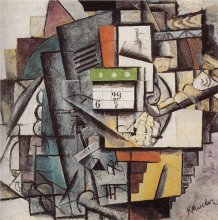
Caption for image: Kazimir Malevich, Lady on a Tram Station (1913)
Academics gather to discuss Europe in 1913
Professor Adam Watt, of the Modern Languages Department, is to host a colloquium of academics from across the Humanities in Exeter and Bristol to discuss an ‘artistic annus mirabilis’, one century on.
Professor Adam Watt will chair the free event, which will feature contributions from Modern Languages (French and Spanish), English, and Art History and Visual Culture at Exeter, together with Bristol colleagues with expertise in French, Art History and Musicology.
Professor Watt said: “The event will give students, colleagues and members of the public the opportunity to come and hear papers that discuss the intertwined developments of visual art, sculpture, the novel, poetry, silent film and music in this extraordinary year, 1913.”
1913 is a year of great interest to scholars in a range of fields, and has been described as the moment of a ‘defiant swansong’ and as ‘the cradle of modernism’. It was a transitional moment, in Paris above all, between the Belle Époque period and the coming of war, and heralded groundbreaking new works by, amongst others, Stravinsky, Freud, D.H. Lawrence and Duchamp.
Professor Watt commented: “As a Proust scholar, 1913 is an important date for me as it is the year of the publication of ‘Swann’s Way’, so 2013 is its centenary year. My illustrated biography of Proust will be published on 1 April this year, and while I was researching that work I was very strongly struck by the extraordinary artistic riches of the year 1913.”
This is an exciting year for Prous scholars, as from the 16 - 18 December 2013 there will be a major centenary conference on Swann’s Way at Reed Hall, Exeter, organised by Professor Watt, with the world’s leading Proustians descending on Exeter from the UK, the US, Japan, France and elsewhere in Europe.
However, Professor Watt explains that the colloquium will be of greater interdisciplinary significance. He continues: “1913 wasn’t just a big year for Proust, it was a year in which a huge number of creative individuals – composers, painters, thinkers – seemed to make breakthroughs in their respective fields, publishing or performing works that we now consider to be the foundation stones of European modernism.”
The event will close with a round table discussion with all speakers, addressing how the artists discussed transcend artistic and national boundaries and contribute in still ongoing ways to a shared European sense of modernity.
Students, staff and public are all welcome at the event, which takes place on the 27 March 2013 from 13:30 – 18:00 in the Forum Exploration Lab 1, Streatham campus. Entry is free and there is no need to book.
More information can be found on the Exeter Arts and Culture website
Enquiries should be directed to Professor Adam Watt at a.a.watt@exeter.ac.uk
Date: 6 March 2013
